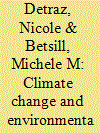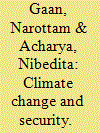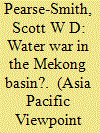|
|
|
Sort Order |
|
|
|
Items / Page
|
|
|
|
|
|
|
| Srl | Item |
| 1 |
ID:
090654


|
|
|
|
|
| Publication |
2009.
|
| Summary/Abstract |
This article explores the implications of the April 2007 United Nations Security debate on the security dimensions of a changing climate for international climate change politics. Specifically, our analysis focuses on whether and how security concerns have been addressed in past international political debates on climate change and considers whether the Security Council debate, which emphasized the threat of climate-related conflict, reflects a discursive shift. We elaborate on two general discourses on the relationship between environment and security, which we call environmental conflict and environmental security. Using content and discourse analysis, we demonstrate that both the historical climate change debate and the more recent Security Council debate have been informed by the environmental security discourse, meaning that a discursive shift has not taken place. We conclude by considering the possibility of a future discursive shift to the environmental conflict perspective and argue that such a shift would be counterproductive to the search for an effective global response to climate change.
|
|
|
|
|
|
|
|
|
|
|
|
|
|
|
|
| 2 |
ID:
127518


|
|
|
| 3 |
ID:
138027


|
|
|
| 4 |
ID:
094547


|
|
|
| 5 |
ID:
177130


|
|
|
|
|
| Summary/Abstract |
‘Fuel riots’ are a distinct type of energy-related conflict. We provide the first fuel riots database and explore their social, economic and environmental drivers. The analysis demonstrates links between fuel riots and high international crude oil prices in countries characterised by weak state capacity, deficient governance, fuel scarcity and poor economic performance. We suggest a potential causal pathway for fuel riots: when international fuel prices spike, net fuel-importing countries bear higher costs. If these countries are politically unstable and their government inefficient, the likelihood of fuel riots is high. Wealthier countries can absorb price increases and maintain subsidies, as opposed to poorer societies where fuel riots are more likely. Our findings demonstrate the role of state capacity and socio-economic conditions in enabling conflict, and will inform policy by identifying fertile ground for fuel riots, i.e. societies likely to be affected by increases in fuel prices due to scarcity and climate action (such as carbon taxes). We propose that policies which better control international prices and action designed to reduce political instability in vulnerable countries are key to preventing fuel riots. Fuel subsidy reform must anticipate popular opposition and mitigate the impact upon vulnerable populations in order to reduce the likelihood of instability and minimise hardship.
|
|
|
|
|
|
|
|
|
|
|
|
|
|
|
|
| 6 |
ID:
089506


|
|
|
|
|
| Publication |
2009.
|
| Summary/Abstract |
This article chronicles the promise and limitations of social movement networks as mechanisms of political voice in Mapuche Chile. Although protest has largely fallen from favour in post-authoritarian Chile, environmental conflicts have shaken the southern territories of the Mapuche Indians since redemocratisation. State promises of indigenous recognition and state access have clashed headlong with ambitious regional development priorities in hydropower and forestry. To resolve claims of injustice over ancestral land and resource rights, Mapuche leaders have forged sophisticated links with environmental organisations, human rights activists, scholars and other indigenous groups. Linkage politics in Chile presents a vital test of civil society development and Latin American democratic consolidation.
|
|
|
|
|
|
|
|
|
|
|
|
|
|
|
|
| 7 |
ID:
107656


|
|
|
|
|
| Publication |
2011.
|
| Summary/Abstract |
This article contributes to our understanding of transboundary environmental management regimes through the application of an analytical framework that facilitates an exploration of the co-existence of conflict and cooperation. Rather than framing conflict and cooperation as mutually exclusive states at opposite ends of a spectrum, we seek to understand the ways in which cooperation can exist at the same time as conflict. We apply this framework to a study of conservation management in a transboundary area at the intersection of the Democratic Republic of Congo, Rwanda and Uganda. We identify two actual and one hypothetical phase of conflict-cooperation relations, in a landscape notorious for some of the worst violence of the last two decades. We map the evolution of phases of transboundary protected area management against the evolving security context, and we find that this approach has greater explanatory power than previous approaches that polarize conflict and cooperation. In particular, it helps us to understand the drivers of environmental cooperation, including the evolving characteristics of that cooperation. This new way of understanding the relationship between environmental management and security also enables us to reconsider the potential for environmental management to be instrumental in working towards interstate security objectives, for example through peace parks. We don't find that the 'low politics' of environmental management should be seen as a predictable and manageable determinant of international relations. But an understanding of the coexistence of conflict and cooperation does also point to a more complex, non-linear relationship between low and high politics.
|
|
|
|
|
|
|
|
|
|
|
|
|
|
|
|
| 8 |
ID:
115237


|
|
|
|
|
| Publication |
2012.
|
| Summary/Abstract |
The Mekong River system provides a crucial source of natural resources for riparian nations. However, the increasingly rapid pace of hydro-development in the Mekong Basin is threatening the integrity of the river system, posing a real concern for Lower Basin states, which are particularly dependent on the basin. This scenario has led to warnings of armed conflict, or even 'water war', between riparian states. Certainly, the expanding scale of hydro-development can be expected to continue increasing interstate tensions in the Mekong region; but are these tensions really likely to escalate to armed conflict? This paper explores this question by drawing on the water and conflict theory of Aaron Wolf. Ultimately, this paper concludes that interstate tensions over Mekong hydro-development are unlikely to generate armed conflict. This is in part due to the strategic impracticality of such a conflict as well as the presence of a river basin management institution. Most compellingly, though, armed conflict is unlikely because the economic imperative shared by Mekong states is better served by cooperation - or at least non-interference - than conflict, over regional hydro-development. In closing, the paper urges that the study of water and conflict in the Mekong Basin be refocused at the intrastate level.
|
|
|
|
|
|
|
|
|
|
|
|
|
|
|
|
|
|
|
|
|